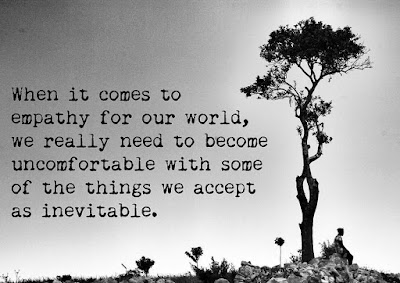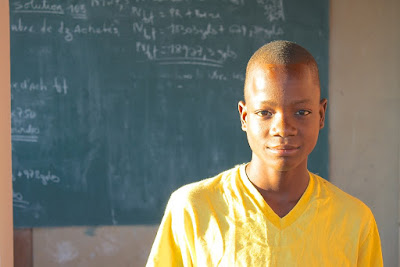 |
| Sunset in Lespinasse, Haiti - cc photo by J. Delp |
Many who read this post will be aware that for the past several years I have been making regular trips to work with schools in Haiti. This September, I will be returning to assist with the beginning of the school year at Good Neighbor Orphanage and School in Croix-de-Boquets, as well as schools in the extremely poor, and rural, communities of Lespinasse and Marre Roseau.
I am going to be very honest and tell you that I am not exactly sure what I am doing in Haiti -- just that I know I am supposed to be there. With every trip that I take to this poverty stricken Caribbean island, I strengthen relationships and learn a great deal from my Haitian friends. In addition, when I am not in Haiti, I do a lot of reading about development and education in the third world. Through a combination of my experiences, and my reading, I have become keenly aware of the potential damage I can do to individuals, or even a community, in spite of having the best of intentions. So with each passing trip, I try to tread a bit lighter. It is not my job to fix everything (nor is it possible, or in the best interest of those I am trying to help). I do my best to make decisions and provide assistance based upon input from those I trust, and not based upon emotions. This is easier said than done, especially when you meet the children.
 |
| School Children in Lespinasse |
Many children in Haiti do not have access, or means, to attend school. Especially in rural communities, where day-to-day survival takes priority over school. Restavek is still a common practice in many areas in Haiti. Restavek is a form of modern slavery in which children are given away (due to extreme poverty) to extended family members, or even strangers, where they perform any number of tasks and chores without pay. Some estimates indicate that one in every fifteen kids in Haiti is a Restavek child. In addition, Haiti has many orphans. However, many of these children have living parents, but they were given up because the parents were unable to afford their care. When poverty at this level exists, it is relatively easy to understand why school is not a primary concern.
The truth is, the needs in Haiti are overwhelming, so making any measurable difference requires a pretty narrow focus. As a school principal, it has made sense for me to look at education as a potential opportunity to make an impact. Most of the schools I have worked with receive no money from the Haitian government, and they are unable to rely on meager tuition payments (if any at all) from the families of students. In most cases they operate with almost no supplies, in inadequate spaces, and without the ability to consistently pay teachers. Teacher training and salaries are a significant issue. A Haitian teacher working at GNO, Marre Roseau, or Lespinasse makes between sixty and eighty U.S. dollars each month. However, in many cases, they go unpaid for their work, or payments are extremely late.
 |
| Classroom at GNO |
On my next trip to Haiti, I will be spending time with the directors at each of the schools: Good Neighbor, Marre Roseau, and Lespinasse. Working with a Haitian friend, we will assist in the development of a financial plan for the upcoming school year — one tailored to the individual needs of each community. The goal is to find a way to engage community members in their school, even if it isn’t through financial support (looking at volunteer time, preparing a meal for the children, donating food or produce, etc.). In addition, I hope to assist in ensuring that teachers are in place for the coming school year, and that there is a plan for paying them a reasonable salary on a consistent basis. I will spend time with the teachers at each school, listen to their concerns, and humbly offer advice on classroom management, teaching practice, and other issues they encounter. Surprisingly, I have not found their concerns to be dramatically different than those of teachers in the United States. Finally, I will spend time with the kids in each school community: playing games, perhaps teaching an English lesson, and talking to them about their experiences and interests.
 |
| Teachers at GNO |
It is a grand plan. I have set an audacious goal of raising $5000 over the next 30 days to support projects and budgets at the three schools. All of the money I raise will be used to assist these school communities (I pay for my own travel expenses). A significant portion of the funds will support teacher salaries, because without committed teachers (who have a reliable source of income) the schools come to a screeching halt. I may not reach my goal, but every contribution matters. There is a Haitian proverb that says, “piti piti wazo fe nich li — little by little, the bird builds it’s nest. That is truly my goal: little by little, build friendships and relationships, support the members of these Haitian communities as THEY seek sustainable solutions, and encourage and love the adults, and children at GNO, Lespinasse, and in Marre Roseau.
 |
| Being Silly at GNO |
If you would like to assist, you can do so in a number of ways:
- Donate on my Crowdrise page: Justice Through Education
- Make a TAX DEDUCTIBLE donation by writing a check to Live Love and putting “HAITI” in the memo line (contact me for a mailing address)
- Pledge a penny, a dime, a quarter, a dollar (or more) for every mile I run in August - Jeff's Miles for Haiti Campaign
- Share this post with friends and family.
Thank you for your consideration.








Comments
Post a Comment